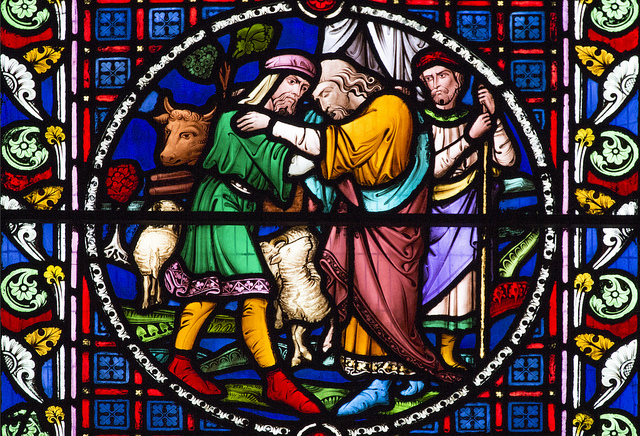“Words of Wondrous Love”

Luke 24:1-12 – March 27, 2016
Have you ever had a very full week? Where a month of experiences have been packed into seven hectic days? At such a busy, sometimes tumultuous time, it’s hard to focus. Difficult to pick up the thread of conversations. Challenging to decide what important thing to do when, especially when there are so many urgent matters waiting for you. Calling for you. Nudging your elbow, clamoring for your attention. Add to all that tumult the trauma of a sudden death.
That is the situation for these faithful women. These women have gone through some gut-wrenching things, these past few days. After the Triumphal Entry into Jerusalem just a short seven days ago, these companions of the Rabbi Jesus had seen their leader in debate with some of the most learned religious teachers and leaders of Israel. Jesus had delivered one of His most stirring sermons—the Olivet Discourse from Matthew’s Gospel, as well as one of the most poignant—the Discourse from the Upper Room, from John’s Gospel.
As if all of that heavy theology from Rabbi Jesus wasn’t enough, their leader Jesus showed Himself to be everyone’s servant. Since there was no servant present at that Passover dinner on Thursday night to wash the guests’ feet, Jesus did it Himself. He took the position of a servant and washed His disciples’ feet. Talk about a mind-blowing experience. Your Rabbi, your teacher, whom you have been following for several years, hanging on His every word and action. This Rabbi, this Jesus becomes a lowly servant and washes everyone’s feet.
But, wait. We’re only getting started. Their Teacher, Rabbi Jesus did something completely unprecedented at supper that night. He took one of the loaves of bread, tore it apart, and said, “This bread? It’s my body. It’s going to be broken for all of you. Take it, and eat it.” Shortly after that, Jesus took one of the cups of wine and said, “This cup? This is the new covenant in my blood, given for you. Take it, and drink.” Jesus took the familiar Passover supper and instituted a new thing—the Lord’s Supper. What we call communion, the Eucharist.
Things really started to follow in rapid succession. The time of intense prayer in the Garden of Gethsemane. The betrayal of Judas, and the arrest of Rabbi Jesus. Repeated trials before Pilate, Herod, the Sanhedrin, the whipping and the scourging. I am certain all of this was reported to the disciples in great detail.
Pilate bringing Jesus before the crowd that Friday morning. The crowd yelling, “Crucify Him! Crucify Him!” So, Pilate sentenced this Rabbi Jesus to death. The Roman death of a criminal, death on a cross. Crucifixion.
Some of Jesus’s followers were there as He bore His cross out of the city of Jerusalem. They saw that agonized walk down the Via Dolorosa, the way of sorrows. Finally, as the cross was raised on Golgotha, Jesus suffered that most painful death, death on a cross.
All of that heartbreaking trauma, horror, and extreme grief were packed into just a few days. Plus, for all good Jews, Saturday was the Sabbath. Not only a regular Sabbath, but the special Sabbath during Passover. The women—the rest of the disciples hardly had a chance to begin to process all of those tumultuous events. They did their best to rest, to hide, to grieve on that seventh day of the week, on that Saturday.
I include the women as disciples of Jesus. As commentator Dennis Bratcher says, “Luke tells us that these women followed Jesus from Galilee and watched Him die on the cross (23:49). The Greek word for “follow” is the usual word used for a disciple …. It seems that Luke wants the readers to understand these women to be disciples of Jesus.” [1]
After all this, the women—trying so hard to be faithful in their friendship and following of their leader and teacher Jesus—take spices to anoint the body. They go to the tomb where Jesus had been hurriedly laid late on Friday, before sundown. As the Gospel tells us, they found the stone rolled away. And, the tomb was—empty!
Can you imagine how confused they were? Distracted? Astonished? Yes, it was early in the morning. The women had difficulty comprehending what was before their eyes. After all the horror and trauma of the last few days, while the women were talking amongst themselves, things got even weirder. As Luke says, “suddenly two men in clothes that gleamed like lightning stood beside them. 5 In their fright the women bowed down with their faces to the ground.”
What would you do if two guys in gleaming white clothes showed up, suddenly appeared right here, in St. Luke’s Church? Pretty scary! Talk about being amazed. Astonished.
The men (we can call them angels, because that’s what they were) said, “Why do you look for the living among the dead? 6 He is not here; He has risen!”
What did I say, a few minutes ago? How at such a busy, sometimes tumultuous time, it’s hard to focus. Difficult to pick up the thread of conversations, to pay attention. What on earth is going on here? We hear the angels say, “Remember how He told you, while He was still with you in Galilee: 7 ‘The Son of Man must be delivered over to the hands of sinners, be crucified and on the third day be raised again.’”
Then—finally!—the women remember the words of their Teacher Jesus. They run back to their friends, the other disciples, telling them what happened. They are witnesses! They say, “The tomb is empty! Jesus is gone! And, we saw angels!”
I suspect we all can predict the reaction of the other disciples. “What? You saw … what? Are you crazy? What is the matter with you?” Luke tells us, “They did not believe the women, because their words seemed to them like nonsense.”
What must it have been like for the disciples to hear the Good News the angels brought? A little far-fetched. Maybe a whole lot far-fetched. They couldn’t take it all in. They didn’t believe it! They thought what the women were saying was crazy talk!
What is it like for us, today, to hear the Good News the angels brought?
Who do you identify with? Do you identify with the women? Do you believe in those words the angels brought, and run and tell your friends? Are you witnesses to the Resurrection? Or, are you like the other disciples? Doubting. Skeptical. Thinking those words seem like nonsense! Crazy talk! Perhaps the disciples didn’t remember the words of Jesus. No, not yet.
Ah, that first Easter morning. As Luke says, the angels remind us that our Lord Jesus told us what was going to happen beforehand. Our Lord Jesus predicted that He must be delivered over to the hands of sinners, be crucified and on the third day be raised again. Those were the words that the women remembered. And just like the women, we, too, can witness to the Resurrection. We can proclaim that powerful, loving, transforming experience that has happened!
What does that message, that Good News the angels brought, mean to you and me? Do we know the wondrous love of Jesus? The wondrous love that led Him to the cross, the wondrous love that pierced Him for our transgressions. And, by His wounds we—all of us are healed. Thank God Jesus died in our place, so we don’t have to be separated from God for eternity. Thank God Jesus conquered death. We have been reconciled to God. That is the Good News of wondrous love the angels brought.
Believe the Good News of the Gospel—Christ is risen! He is risen, indeed!
(I appreciate Readings, Analysis of Texts and Preaching Paths, Dennis Bratcher, Christian Resource Institute. Thanks for the assistance in understanding the text from Luke.)
[1] http://www.crivoice.org/lectionary/YearC/Ceaster1nt.html#text2
Suggestion: visit me at my daily blog: matterofprayer: A Year of Everyday Prayers– where I am doing a Lenten journey. #PursuePEACE – And my other blog, A Year of Being Kind -Thanks!






